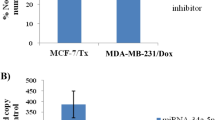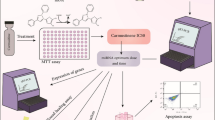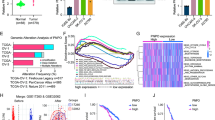Abstract
5-Fluorouracil (5-FU) as a chemotherapeutic drug is used to treat colorectal cancer (CRC). However, 5-FU is associated with acquired CRC resistance, which decreases the therapeutic potential of 5-FU. Several studies indicated that miR-200c is also involved in chemotherapeutic drug resistance, but the exact mechanism of miR-200c mediated chemoresistance has not yet been fully understood. In this study, we examined the effect of inhibition of miR-200c on the sensitivity of HCT-116 cells to 5-FU. HCT-116 cells were transfected with LNA-anti- miR-200c for 48 h. mRNA expression of miR-200c was investigated by qRT-PCR. The protein expression of phosphatase and tensin homolog (PTEN) and E-cadherin were evaluated by western blotting. Annexin V/ PI staining and caspase 3 activity were used to detect apoptosis. LNA-anti-miR-200c inhibited the miR-200c expression in the transfected cells compared with that in the control group. LNA-anti-miR-200c suppressed the expression of PTEN and E-cadherin independent of the presence of the chemotherapeutic drug 5-FU. LNA-anti-miR-200c reduced the 5-FU-induced apoptosis and caspase 3 activity. miR-200c, as a novel prognostic marker in CRC, can be a potential therapeutic approach to overcome chemoresistance during 5-FU chemotherapy.





Similar content being viewed by others
References
Deng J, Lei W, Fu J-C, Zhang L, Li J-H, Xiong J-P (2014) Targeting miR-21 enhances the sensitivity of human colon cancer HT-29 cells to chemoradiotherapy in vitro. Biochem Biophys Res Commun 443(3):789–795
Draht MX, Riedl RR, Niessen H, Carvalho B, Meijer GA, Herman JG et al (2012) Promoter CpG island methylation markers in colorectal cancer: the road ahead. Epigenomics 4(2):179–194
Davoodi H, Hashemi SR, Seow HF (2013) 5-fluorouracil induce the expression of TLR4 on HCT116 colorectal cancer cell line expressing different variants of TLR4. Iran J Pharm Res:IJPR 12(2):453
Boyer J, McLean EG, Aroori S, Wilson P, McCulla A, Carey PD et al (2004) Characterization of p53 wild-type and null isogenic colorectal cancer cell lines resistant to 5-fluorouracil, oxaliplatin, and irinotecan. Clin Cancer Res 10(6):2158–2167
Hsu H-C, Liu Y-S, Tseng K-C, Hsu C-L, Liang Y, Yang T-S et al (2013) Overexpression of Lgr5 correlates with resistance to 5-FU-based chemotherapy in colorectal cancer. Int J Color Dis 28(11):1535–1546
Wang W, Cassidy J, O’Brien V, Ryan KM, Collie-Duguid E (2004) Mechanistic and predictive profiling of 5-fluorouracil resistance in human cancer cells. Cancer Res 64(22):8167–8176
Leichman L, Lenz H-J, Leichman C, Groshen S, Danenberg K, Baranda J et al (1995) Quantitation of intratumoral thymidylate synthase expression predicts for resistance to protracted infusion of 5-fluorouracil and weekly leucovorin in disseminated colorectal cancers: preliminary report from an ongoing trial. Eur J Cancer 31(7):1306–1310
Lau M, Klausen C, Leung P (2011) E-cadherin inhibits tumor cell growth by suppressing PI3K/Akt signaling via β-catenin-Egr1-mediated PTEN expression. Oncogene 30(24):2753–2766
Bushati N, Cohen SM (2007) microRNA functions. Annu Rev Cell Dev Biol 23:175–205
Li Z, Wang L, Zhang W, Fu Y, Zhao H, Hu Y et al (2007) Restoring E-cadherin-mediated cell–cell adhesion increases PTEN protein level and stability in human breast carcinoma cells. Biochem Biophys Res Commun 363(1):165–170
Slaby O, Jancovicova J, Lakomy R, Svoboda M, Poprach A, Fabian P et al (2010) Expression of miRNA-106b in conventional renal cell carcinoma is a potential marker for prediction of early metastasis after nephrectomy. J Exp Clin Cancer Res 29(1):1
Philippidou D, Schmitt M, Moser D, Margue C, Nazarov PV, Muller A et al (2010) Signatures of microRNAs and selected microRNA target genes in human melanoma. Cancer Res 70(10):4163–4173
Karakatsanis A, Papaconstantinou I, Gazouli M, Lyberopoulou A, Polymeneas G, Voros D (2013) Expression of microRNAs, miR-21, miR-31, miR-122, miR-145, miR-146a, miR-200c, miR-221, miR-222, and miR-223 in patients with hepatocellular carcinoma or intrahepatic cholangiocarcinoma and its prognostic significance. Mol Carcinog 52(4):297–303
Cochrane DR, Spoelstra NS, Howe EN, Nordeen SK, Richer JK (2009) MicroRNA-200c mitigates invasiveness and restores sensitivity to microtubule-targeting chemotherapeutic agents. Mol Cancer Ther 8(5):1055–1066
Ceppi P, Mudduluru G, Kumarswamy R, Rapa I, Scagliotti GV, Papotti M et al (2010) Loss of miR-200c expression induces an aggressive, invasive, and chemoresistant phenotype in non–small cell lung cancer. Mol Cancer Res 8(9):1207–1216
Feng X, Wang Z, Fillmore R, Xi Y (2014) MiR-200, a new star miRNA in human cancer. Cancer Lett 344(2):166–173
Chen J, Wang W, Zhang Y, Hu T, Chen Y (2014) The roles of miR-200c in colon cancer and associated molecular mechanisms. Tumor Biol 35(7):6475–6483
Sharifi M, Salehi R, Gheisari Y, Kazemi M (2014) Inhibition of microRNA miR-92a induces apoptosis and inhibits cell proliferation in human acute promyelocytic leukemia through modulation of p63 expression. Mol Biol Rep 41(5):2799–2808
Mirzamohammadi S, Aali E, Najafi R, Kamarul T, Mehrabani M, Aminzadeh A et al (2015) Effect of 17β-estradiol on mediators involved in mesenchymal stromal cell trafficking in cell therapy of diabetes. Cytotherapy 17(1):46–57
Wiklund ED, Bramsen JB, Hulf T, Dyrskjøt L, Ramanathan R, Hansen TB et al (2011) Coordinated epigenetic repression of the miR-200 family and miR-205 in invasive bladder cancer. Int J Cancer 128(6):1327–1334
Davalos V, Moutinho C, Villanueva A, Boque R, Silva P, Carneiro F et al (2012) Dynamic epigenetic regulation of the microRNA-200 family mediates epithelial and mesenchymal transitions in human tumorigenesis. Oncogene 31(16):2062–2074
Magee P, Shi L, Garofalo M (2015) Role of microRNAs in chemoresistance. Ann Transl Med 3(21):332. doi:10.3978/j.issn.2305-5839.2015.11.32
Chen Y, Sun Y, Chen L, Xu X, Zhang X, Wang B et al (2013) miRNA-200c increases the sensitivity of breast cancer cells to doxorubicin through the suppression of E-cadherin-mediated PTEN/Akt signaling. Mol Med Rep 7(5):1579–1584
Yin Y, Shen W (2008) PTEN: a new guardian of the genome. Oncogene 27(41):5443–5453
Lu Y-X, Yuan L, Xue X-L, Zhou M, Liu Y, Zhang C et al (2014) Regulation of colorectal carcinoma Stemness, growth, and metastasis by an miR-200c-Sox2–negative feedback loop mechanism. Clin Cancer Res 20(10):2631–2642
Liao C, Chen W, Fan X, Jiang X, Qiu L, Chen C et al (2014) MicroRNA-200c inhibits apoptosis in pituitary adenoma cells by targeting the PTEN/Akt signaling pathway. Oncol Res 21(3):129–136
Berlanga P, Muñoz L, Piqueras M, Sirerol JA, Sánchez-Izquierdo MD, Hervás D et al (2016) miR-200c and phospho-AKT as prognostic factors and mediators of osteosarcoma progression and lung metastasis. Mol Oncol
Vivanco I, Sawyers CL (2002) The phosphatidylinositol 3-kinase–AKT pathway in human cancer. Nat Rev Cancer 2(7):489–501
Oki E, Baba H, Tokunaga E, Nakamura T, Ueda N, Futatsugi M et al (2005) Akt phosphorylation associates with LOH of PTEN and leads to chemoresistance for gastric cancer. Int J Cancer 117(3):376–380
Hur K, Toiyama Y, Takahashi M, Balaguer F, Nagasaka T, Koike J et al (2013) MicroRNA-200c modulates epithelial-to-mesenchymal transition (EMT) in human colorectal cancer metastasis. Gut 62(9):1315–1326
Livak KJ, Schmittgen TD (2001) Analysis of relative gene expression data using real-time quantitative PCR and the 2− ΔΔCT method. Methods 25(4):–402, 8
Boominathan L (2010) The tumor suppressors p53, p63, and p73 are regulators of microRNA processing complex. PLoS One 5(5):e10615
Sun J, Ding W, Zhi J, Chen W (2015) MiR-200 suppresses metastases of colorectal cancer through ZEB1. Tumor Biol 1–7
Karimi Dermani F, Saidijam M, Amini R, Mahdavinezhad A, Heydari K, Najafi R (2016) Resveratrol inhibits proliferation, invasion, and epithelial–Mesenchymal transition by increasing miR-200c expression in HCT-116 colorectal cancer cells. J Cell Biochem
Kim SM, Kim JS, Kim J-H, Yun C-O, Kim EM, Kim HK et al (2010) Acquired resistance to cetuximab is mediated by increased PTEN instability and leads cross-resistance to gefitinib in HCC827 NSCLC cells. Cancer Lett 296(2):150–159
Takamizawa J, Konishi H, Yanagisawa K, Tomida S, Osada H, Endoh H et al (2004) Reduced expression of the let-7 microRNAs in human lung cancers in association with shortened postoperative survival. Cancer Res 64(11):3753–3756
Gotanda K, Hirota T, Matsumoto N, Ieiri I (2013) MicroRNA-433 negatively regulates the expression of thymidylate synthase (TYMS) responsible for 5-fluorouracil sensitivity in HeLa cells. BMC Cancer 13(1):369
Hewish M, Lord CJ, Martin SA, Cunningham D, Ashworth A (2010) Mismatch repair deficient colorectal cancer in the era of personalized treatment. Nat Rev Clin Oncol 7(4):197–208
Bronckaers A, Gago F, Balzarini J, Liekens S (2009) The dual role of thymidine phosphorylase in cancer development and chemotherapy. Med Res Rev 29(6):903–953
Holzner S, Senfter D, Stadler S, Staribacher A, Nguyen CH, Gaggl A et al (2016) Colorectal cancer cell-derived microRNA200 modulates the resistance of adjacent blood endothelial barriers in vitro. Oncol Rep 36(5):3065–3071
Chen J, Wang W, Zhang Y, Chen Y, Hu T (2014) Predicting distant metastasis and chemoresistance using plasma miRNAs. Med Oncol 31(1):1–7
Toden S, Okugawa Y, Jascur T, Wodarz D, Komarova NL, Buhrmann C et al (2015) Curcumin mediates chemosensitization to 5-fluorouracil through miRNA-induced suppression of epithelial-to-mesenchymal transition in chemoresistant colorectal cancer. Carcinogenesis 36(3):355–367
Bonci D, Coppola V, Musumeci M, Addario A, Giuffrida R, Memeo L et al (2008) The miR-15a–miR-16-1 cluster controls prostate cancer by targeting multiple oncogenic activities. Nat Med 14(11):1271–1277
Acknowledgements
This study was funded by the Hamadan University of Medical Sciences (grant no.: 9407073722).
Author information
Authors and Affiliations
Corresponding author
Ethics declarations
Conflict of Interest
The authors declare no conflict of interest.
Rights and permissions
About this article
Cite this article
Heydari, K., Saidijam, M., Sharifi, M.r. et al. The Effect of miR-200c Inhibition on Chemosensitivity (5- FluoroUracil) in Colorectal Cancer. Pathol. Oncol. Res. 24, 145–151 (2018). https://doi.org/10.1007/s12253-017-0222-6
Received:
Accepted:
Published:
Issue Date:
DOI: https://doi.org/10.1007/s12253-017-0222-6




